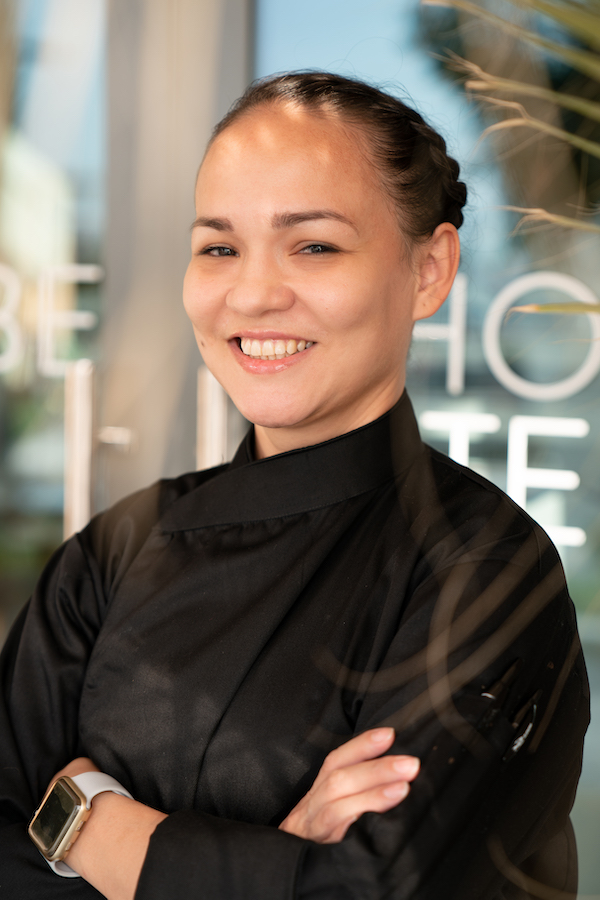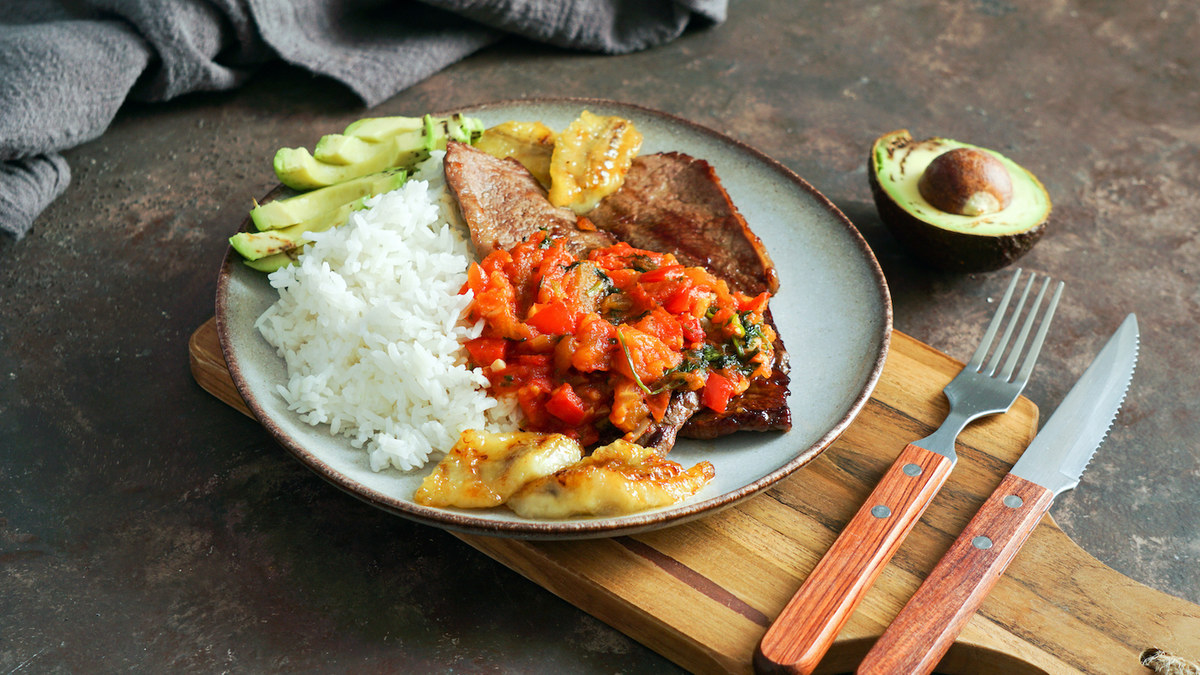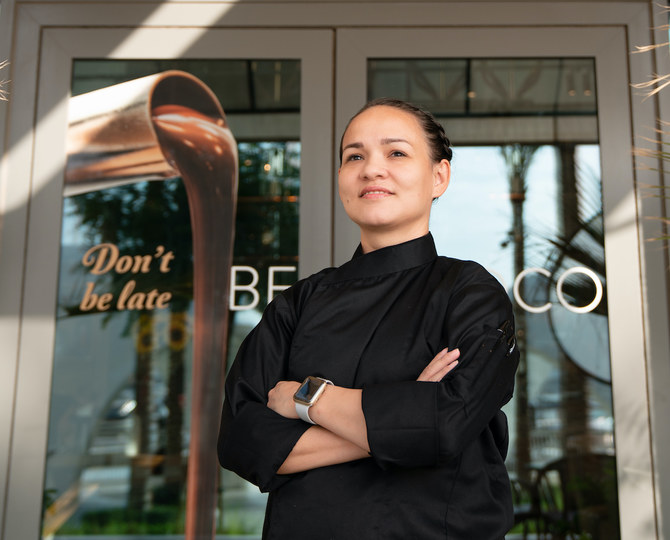DUBAI: Colombian chef Luisa Fernanda Caicedo was on holiday in Nepal when the COVID-19 pandemic hit and travel restrictions were imposed. At first, she and her husband were told they would be able to return to New York (where Caicedo had spent more than a decade in the industry) within 15 days. Then they were told the same again. And again. Seven months later, they were still in the same Airbnb place, and Caicedo was pregnant. She wanted to give birth somewhere she felt more confident about the medical care available, but the doctors told her not to take a flight of more than eight hours. A short Google session later, she had settled on Dubai. After their daughter was born safely in November last year, Caicedo decided maybe it would be worth finding a job in the UAE. She is now the executive chef at Mondoux in Dubai Creek Harbour, which serves mainly European cuisine. “We want to showcase healthy food with good flavors,” she tells Arab News. “A back-to-basics approach.”
Here, Caicedo offers some tips to those wanting to improve their cooking and provides a simple recipe for a tasty dish. It’s one of her mother’s recipes, actually. “Even though I’ve tried to make it many times, hers always comes out better,” she says.

Luisa Fernanda Caicedo is a Colombian chef. (Supplied)
Q: When you started out as a professional, what was the most-common mistake you made when preparing/cooking a dish?
A: Thinking that I knew all the recipes by heart. I’d memorize them, but it takes years of practice; it’s like muscle-memory. I’d cook something and think “Why isn’t it coming out right?” Then I’d look at the recipe and see I’d forgotten an ingredient. I think young chefs are like that — they think they know everything.
Q: Is it seen as embarrassing for a professional to look at the recipe?
A: Well, when you’re the new kid and you see all these guys just measuring things without checking, I guess it is. But then you realize they’ve been doing it for years. And eventually I got there.
Q: What’s your top tip for amateur chefs?
A: Follow your heart. Or your gut. Keep it simple. Taste everything while you’re cooking.
Q: What one ingredient can instantly improve any dish?
A: I would say herbs. My favorites are thyme and rosemary. They give anything — vegetables, meat, rice — a little extra flavor. But it’s like perfume; you don’t want to use too much.

Sobrebarriga is often cooked on Sundays. (Supplied)
Q: When you go out to eat, do you find yourself critiquing the food? What’s the most-common issue that you have in other restaurants?
A: Actually, my husband’s the one who likes to give feedback other restaurant’s food. I try to separate my work from going out. If I’m in that professional (mode) I really don’t enjoy it. Of course, if I don’t like it, I’ll say something. But I try to separate it. Also, I don’t go to Italian restaurants, because I find the pasta can be too expensive and I can do it better at home.
Q: When you do go out, what’s your favorite cuisine?
A: I love Korean food. I love all South Asian food, but especially Korean. A nice barbeque, some kimchi… Either that or a nice steak.
Q: What’s your go-to dish if you have to put something together in, say, 20 minutes?
A: I’d usually go for something that I miss from home. Maybe rice, beans and a piece of meat. Or just a simple salad and grilled chicken. Nothing complicated.
Q: What request or behavior by customers most annoys you?
A: I understand that people might not like their meat raw, but when you get a beautiful — and expensive — rib-eye steak, say, and you order it well done? That annoys me. Or when they want to completely change a dish. Like, “I’ll have the burger, but instead of this and this can I have that and that?” I’ll do it. But I’m like, “You could have just gone to a (fast-food chain).”
Q: What’s your favorite dish to cook?
A: Well, I like to cook things that aren’t accessible (locally) and, like I said, that remind me of home. So I try to replicate my mom’s recipes. There’s a dish in Colombia called sobrebarriga. You’d often cook it on Sundays when the whole family is hanging out. It takes forever to cook. It’s a flank steak, usually. You have to cook it very slow — or you do a quick grill on it — otherwise it’ll be tough and chewy. So it’ll take, say, four hours in the oven with a lot of seasoning, onion, tomato, garlic, coriander. It’s just a little piece of home. A piece of mom.
Q: Are you quite tyrannical in the kitchen? Do you shout much? Or are you quite chilled-out?
A: I like to treat people the way I like to be treated. Personally, I don’t respond well to someone shouting at me. I’ll shut down. So I’m more about asking questions and trying to help people get better. If I see someone make a mistake, I’ll correct it. If they make the same mistake, I’ll ask them why; maybe I wasn’t clear enough the first time. Of course, if you keep making the mistake, I’ll get upset. I’ll curse a little bit. But I don’t yell, I use my ‘spa voice’ — like, the loud whisper you’d use in the spa or in the doctor’s waiting room when you’re trying not to disturb people.
Chef Luisa’s arroz con pollo (Chicken rice)

Caicedo shared with Arab News her chicken rice recipe. (Shutterstock)
INGREDIENTS (serves 4):
For the chicken and stock
2 whole chicken breasts, bone-in and skin removed; 1 scallion; ½ white onion; 2 garlic cloves; 1 sprig of rosemary; 1 sprig of thyme; ½ tbsp Sazón Goya with saffron (substitute with turmeric if not available); Salt and pepper to taste
For the rice
2 tbsp olive oil; ¼ cup finely diced onions; 1 garlic clove, minced; ¼ cup red bell pepper and ¼ cup green bell pepper, diced into small cubes; 1 cup long-grain white rice; 2 ½ cups chicken stock (prepared when cooking chicken breasts); ½ tbsp Sazón Goya with saffron (azafran); ¼ cup chopped fresh cilantro; ½ cup peas; ½ cup diced carrots; ½ cup diced green beans
INSTRUCTIONS:
1. Place chicken breast, 5 cups of water and remaining stock ingredients in medium pot. Bring to boil, cover and reduce heat to medium-low. Cook for 20-25 mins. Turn heat off and let chicken rest in covered pot for c.15 mins. Once cooled, cut into small cubes and set aside. Strain stock. Measure 2 ½ cups and set aside.
2. In medium pot, heat olive oil over medium-high heat. Add onions, peppers and garlic. Cook for 4- 5 mins until onions are translucent.
3. Add rice and Sazón Goya (or turmeric). Stir for c.3 minutes, until rice is well coated. Add chicken stock and bring to a boil. Taste broth and adjust seasoning as needed. Reduce heat, cover and simmer for c.15 minutes. Add peas, carrots and green beans and cook for an additional 7 mins. Add shredded chicken and cilantro. Mix well, cover and cook for another 5 mins. Then serve and enjoy!



















